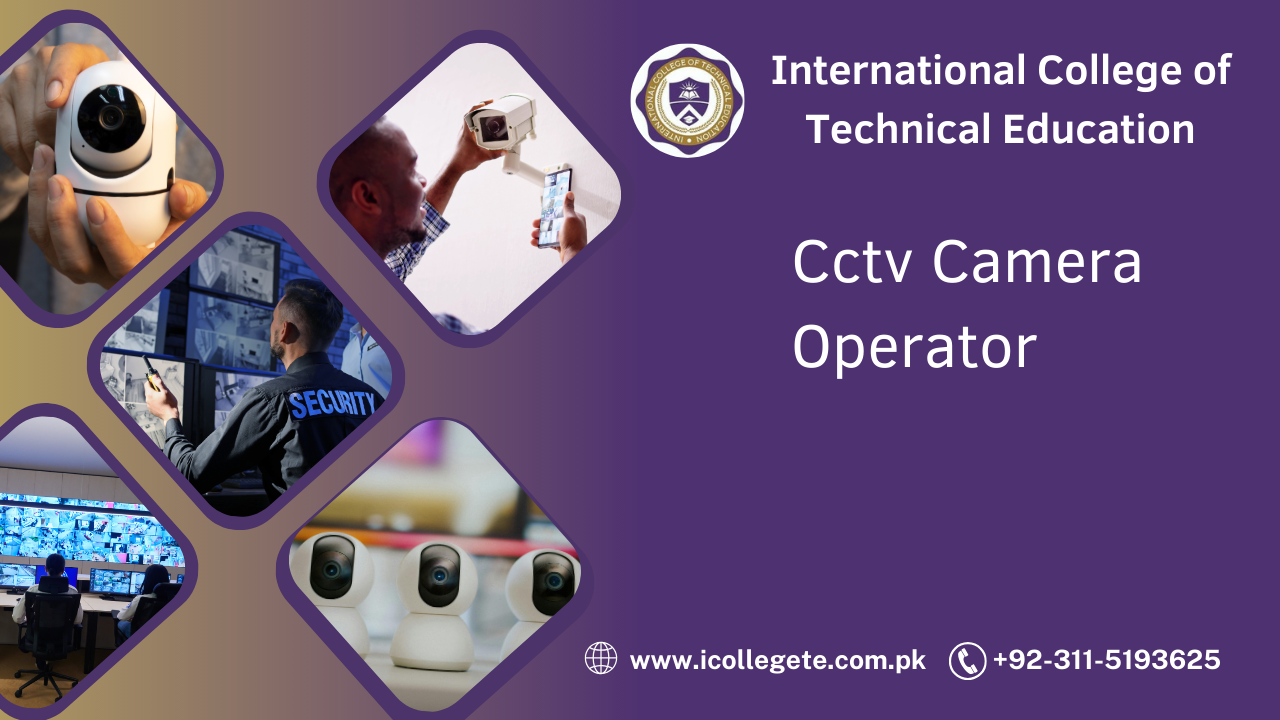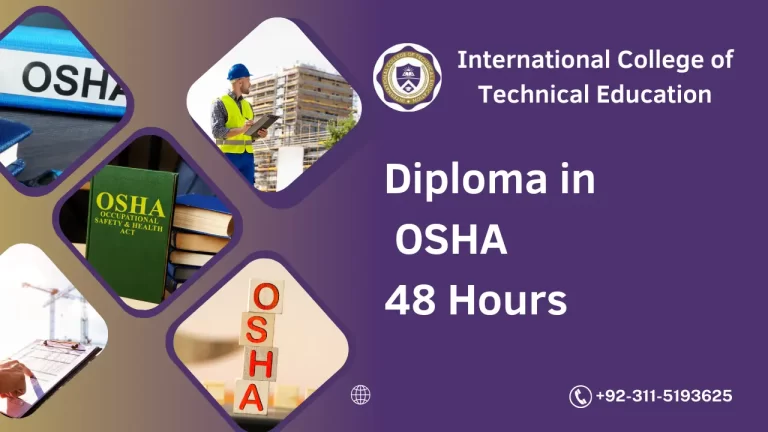With increasing concerns about security and the rapid growth of urbanization, the demand for surveillance professionals has reached new heights. CCTV systems play a critical role in securing properties, businesses, and public spaces, and skilled CCTV camera operators are at the heart of this technology.
The CCTV Camera Operator Course in Islamabad is designed to provide students with the practical and technical skills needed to operate and monitor CCTV systems effectively. From basic operations to more advanced surveillance techniques, this course covers everything you need to know to excel as a CCTV operator. Whether you’re aiming to work in security companies, law enforcement, or private enterprises, this course will give you the expertise to handle various types of surveillance equipment and ensure a high level of security.
Course Overview
This course provides a detailed introduction to the role of a CCTV camera operator and the essential responsibilities that come with it. Students will learn how to operate and control different types of CCTV cameras, monitor footage in real-time, and ensure that the system is functioning optimally. The curriculum focuses on both technical skills, like camera adjustments and software usage, as well as understanding the principles of surveillance and security management.
Key components of the course include:
- Introduction to CCTV Camera Operations
- Understanding Different CCTV Systems
- Real-time Monitoring and Recording
- Troubleshooting Common Camera Issues
- Surveillance Ethics and Privacy Concerns
- Security Protocols and Reporting
Study Units
The CCTV Camera Operator Course is divided into several core study units, each focusing on essential skills and concepts that will help students succeed in the field of surveillance. These units include:
- Introduction to CCTV Systems and Camera Types:
- Overview of CCTV systems and their importance in modern security.
- Introduction to different types of CCTV cameras: analog, IP cameras, PTZ (Pan-Tilt-Zoom) cameras, and wireless cameras.
- Understanding the setup and layout of a CCTV system for different environments (residential, commercial, public spaces).
- Camera Operation and Monitoring Techniques:
- How to operate CCTV cameras to ensure maximum coverage.
- Adjusting angles, zoom levels, and focus for optimal image capture.
- Managing multiple cameras and ensuring effective surveillance coverage across various areas.
- Surveillance Software and Recording Systems:
- Overview of software used in CCTV monitoring, such as DVRs (Digital Video Recorders) and NVRs (Network Video Recorders).
- Techniques for recording, storing, and retrieving footage.
- Remote access and live streaming for monitoring surveillance feeds from different locations.
- Troubleshooting and Maintenance:
- Identifying and resolving common camera issues, such as signal loss, image distortion, and equipment malfunctions.
- Routine maintenance procedures to ensure camera functionality and system reliability.
- Understanding wiring, connectivity issues, and software malfunctions.
- Ethics, Privacy, and Legal Issues in CCTV Surveillance:
- Understanding privacy laws and ethical considerations related to surveillance.
- Knowing when and how to capture footage legally.
- Reporting suspicious activities and handling sensitive footage responsibly.
- Security Protocols and Incident Reporting:
- Techniques for monitoring real-time footage and responding to incidents.
- Properly documenting incidents and creating security reports.
- Collaborating with law enforcement or security teams when necessary.
Learning Outcomes
By the end of the CCTV Camera Operator Course, students will be able to:
- Understand the core functions of CCTV systems and the role of a CCTV camera operator.
- Operate various types of CCTV cameras, including PTZ, analog, and IP cameras, to ensure effective surveillance.
- Monitor and record surveillance footage, managing multiple camera feeds simultaneously.
- Troubleshoot and resolve common issues with CCTV systems and equipment.
- Adhere to privacy laws and ethical standards in surveillance operations.
- Prepare and submit detailed security reports based on observations from CCTV footage.
- Understand the legal responsibilities associated with monitoring and using surveillance equipment.
Course Benefits
Enrolling in the CCTV Camera Operator Course in Islamabad offers a wide range of benefits for individuals interested in a career in surveillance:
- Hands-on Training: The course offers practical experience with different types of CCTV systems, including real-time monitoring and system management, ensuring students are job-ready.
- Industry-Relevant Skills: Students will be equipped with the latest techniques and tools used in the CCTV industry, ensuring they are up-to-date with current technology.
- High Demand for Surveillance Professionals: As security concerns rise, businesses, government institutions, and even private individuals are investing more in CCTV systems, creating a high demand for trained camera operators.
- Diverse Job Opportunities: Graduates of the course can find job opportunities in a wide range of sectors, including security firms, law enforcement, government agencies, commercial enterprises, and residential properties.
- Competitive Salary and Job Security: The growing need for qualified CCTV operators translates into a competitive salary and long-term job stability for those with the right skills.
- Certification: Successful completion of the course provides students with a certification that validates their expertise and enhances their credibility in the job market.
Who is This Course For?
This course is ideal for a wide range of individuals, including:
- Beginners in Surveillance Technology: Individuals with little to no prior knowledge of CCTV systems who wish to pursue a career in security and surveillance.
- Existing Security Professionals: Individuals working in security-related fields who want to expand their expertise to include CCTV operations.
- IT and Networking Professionals: People with an interest in integrating CCTV systems into broader security networks or those wanting to learn more about CCTV surveillance technology.
- Career Switchers: Individuals looking to transition into the security industry and take on roles as CCTV camera operators.
Future Progression After the Course
After completing the CCTV Camera Operator Course, graduates have several opportunities to further their careers:
- Work as a CCTV Camera Operator: Graduates can begin working in a variety of environments, from private security companies to government institutions, managing surveillance systems and ensuring effective monitoring.
- Specialize in Advanced Surveillance Technologies: Students may choose to specialize in advanced technologies such as IP camera networks, cloud-based surveillance systems, or video analytics, offering more career advancement and higher salaries.
- Pursue Leadership Roles: Experienced CCTV operators can progress to supervisory or management roles, overseeing a team of technicians, coordinating surveillance efforts, and ensuring system upgrades and compliance.
- Work with Law Enforcement Agencies: Graduates can explore opportunities with law enforcement or security agencies, where their skills in surveillance and incident documentation can play a critical role in investigations.
- Launch a Career in Security Consulting: With experience and expertise, graduates can start their own consulting business, offering CCTV installation and operational services to clients.
- International Career Opportunities: With increasing global demand for security professionals, graduates can explore job opportunities abroad in countries with expanding security infrastructures.
The CCTV Camera Operator Course in Islamabad is an excellent starting point for anyone interested in the surveillance and security industry. With hands-on training, industry-relevant skills, and a focus on both technical and ethical considerations, this course prepares students for a fulfilling career as CCTV operators. Given the growing importance of security across the globe, there has never been a better time to enter this field. With certification in hand, graduates will be well-equipped to take on rewarding roles in the world of surveillance and security technology.







